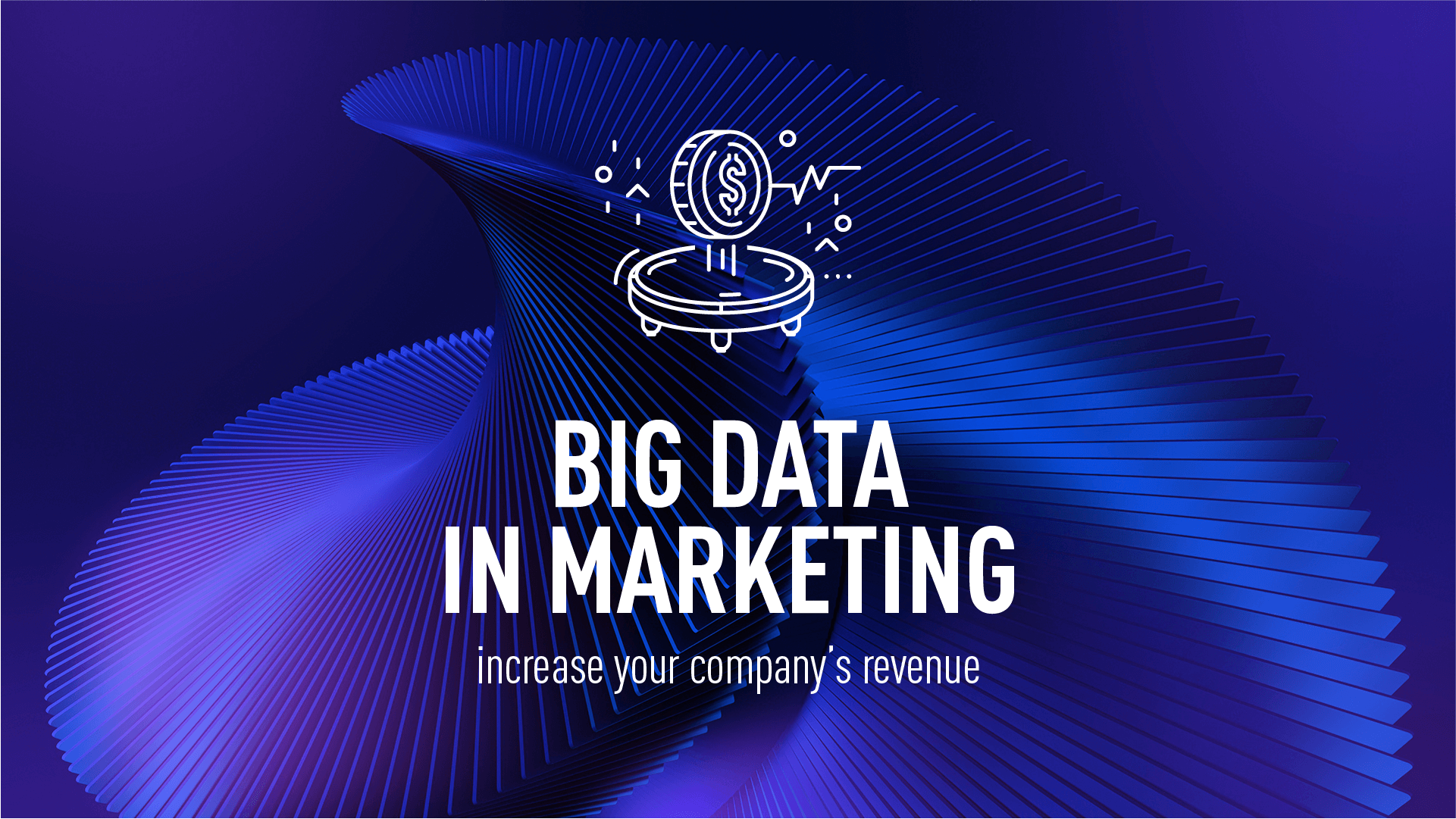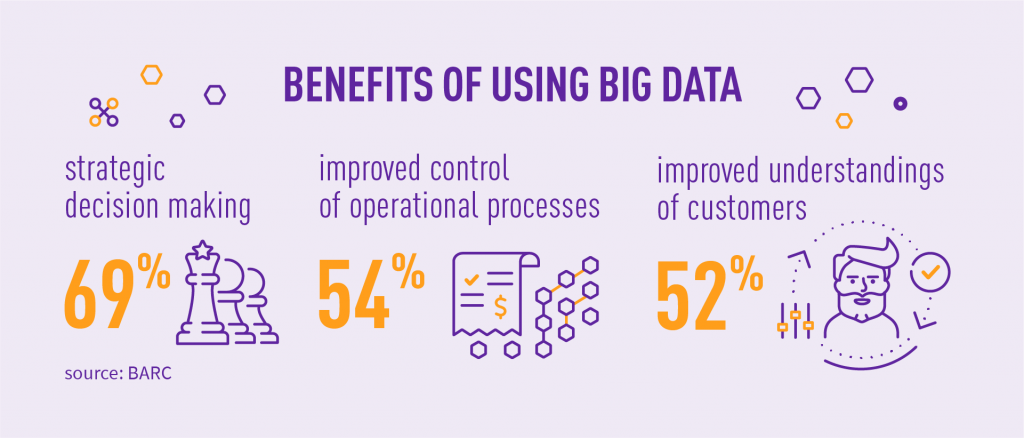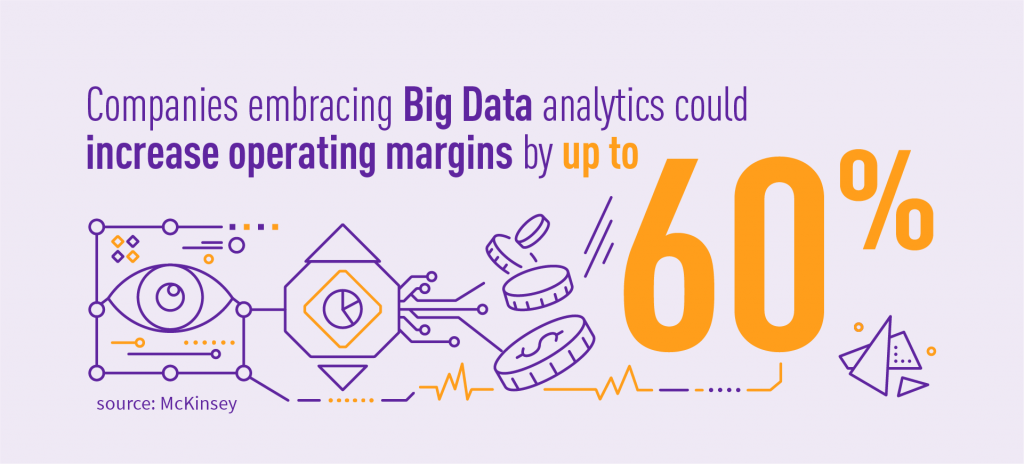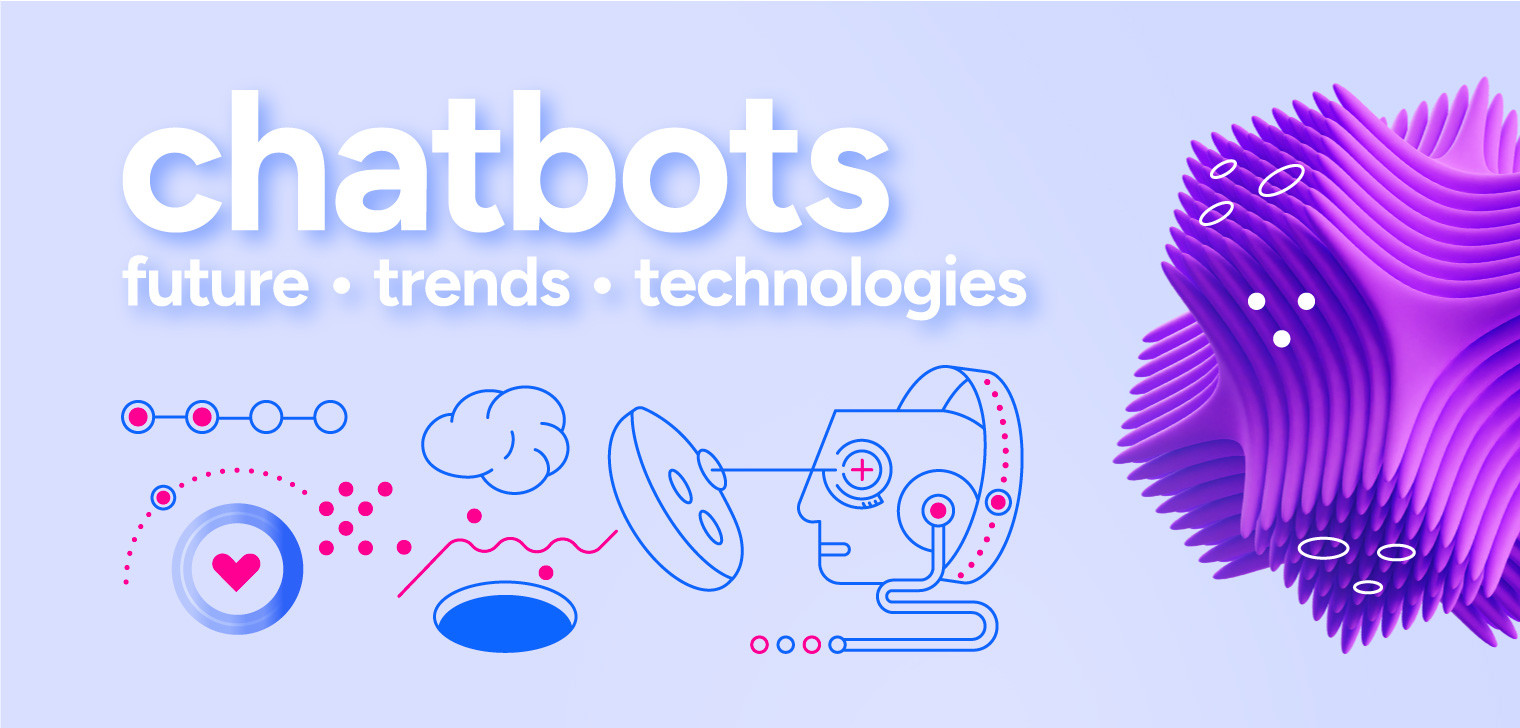Insights
- category:
How using Big Data in marketing increases your company’s revenue?

Nowadays, consumers can be reached at all times. As they move among their devices and various digital channels, they create multiple touchpoints across different online and offline mediums. To marketers, all the information about customers’ activities presents a fantastic opportunity to adjust marketing strategies. Using Big Data analytics in marketing can help maximize marketing output.
What is Big Data?
Big Data refers to massive complex data sets that are generated from various sources and grow exponentially with time. These attributes comprise the three Big Data Vs: huge volume, high velocity, and extensible variety. Big data is so large in size and storage that it is impossible to be understood efficiently by humans or traditional data management tools.
We can divide big data types into three segments:
- Structured data can be used for effective analysis and is represented by columns and rows in relational databases. It can easily be mapped into pre-designed fields. It is the most popular and simplest way to manage information.
- Semi-structured data does not reside in a relational database but has some organizational properties that make it easier to analyze (e.g., XML data).
- Unstructured data is not organized in a predefined manner or does not have a predefined data model; thus, it is difficult for a mainstream relational database (e.g., word files, PDFs, text, or media logs).

Main benefits of using Big Data in marketing
Big Data in marketing provides insights into which content is the most effective at each stage of a sales cycle, how customer relationships can be improved, or what strategies can increase conversion rates. But let’s look at the main benefits it can bring to marketing companies.
Increase customer engagement
Next Best Action (NBA) is a customer-centric approach that considers all potential offers for each individual customer in real-time and then chooses the optimal one. NBA offer is determined by the customer’s interests but also takes into account the company’s marketing objectives, policies, and regulations.
NBA is enabled through the use of real-time decisioning technology and Big Data analytics that helps determine offers suitable for customers at the moment of interaction. Later, these are prioritized and optimized to choose the best one. Also, Big Data sources such as social media, clicks or interactions can be used to boost the predictability of the analytical models significantly.
Big data analytics enables companies to monitor events in real-time and embed insights in real-time decision-making. This helps in contextual, personalised, and dynamic decision recommendations to customers across various channels.
Personalize advertising and offerings
Online shopping is increasingly converted into a personalized experience through collecting and processing vast amounts of customer data. Big Data in marketing allows companies to gather information about customers’ preferences, browsing history, purchasing behaviour, and anything else that can be digitally recorded.
This data is converted into insights that help identify customer interests, recommend products, identify seasonal purchases and predict current and future needs. With the gathered knowledge, companies can provide a personalized experience and help them find what they want at the best possible price. Personalization saves time and increases satisfaction. The use of Big Data has drastically changed the rules of online shopping.
Build stronger relationships with customers
Knowing customers and their preferences enables the marketing team to understand the decision-making processes. With this knowledge, they can make the customer’s journey more streamlined, smoother and easier. Suppose companies know that the consumers are inclined towards their brand because of their membership rewards and loyalty program. In that case, the marketing team can focus on strategies to promote their loyalty program to attract such customers.
With the knowledge gathered thanks to Big Data analytics, you can also perform customer segmentation to deliver the right marketing content to the right group. For example, if customers of a certain age group use social media, the company can promote its products online via these channels. Also, customers’ data enables online stores to propose the right products at the right time, which makes cross and up-selling processes more convenient.
Optimize marketing budget
Big Data enables companies to gather information about competitors and prices they set over the years. It can help understand customers’ purchasing power without incurring any revenue losses. The marketing team can not only help in controlling the price regulation, but they can also provide suggestive measures to justify the prices the company sets for their products.
Also, insights gathered about these prices can help companies create further strategies to get rid of the old products during sales or to plan prices for the launch of new products.
Design better-targeted campaigns
Campaigns, mainly on social media or other digital channels, can be one of the most valuable marketing tactics for companies. They are designed so that everyone can participate from their various accounts. As Big Data can also be collected from social media, the marketing teams can follow trends and adapt them for their marketing strategy.
Big Data gives an overall understanding of which channels deliver the best results. Companies can use that knowledge to adjust their advertising budget to these channels. Also, most marketing is done by advertising the products on various channels, so the brand that implements Big Data analytics can completely modify its marketing strategies.
Gain valuable insights
Finally, Big Data in marketing enables companies to gain greater insights and actionable intelligence into key drivers of their business. Generating revenue, reducing costs, and working capital are three main areas where it delivers value. Companies’ revenue increases more efficiently when managed using advanced analytics and Big Data.

A few examples proving how Big Data in marketing can improve revenue
We have already proved that Big Data in marketing can bring many benefits, significantly improving customer experience. But what does it look like in the real world? The examples below show how companies used Big Data in their marketing strategies and succeeded.
Netflix
Netflix, an American subscription streaming service and production company, used Big Data to help them create its first hit TV series. The platform has around 140 million subscribers worldwide, thus collecting huge amounts of data, such as viewing habits, location, genre preferences, or searches. Using this data, Netflix can create better programs to engage its subscribers. But the company used Big Data analytics to create something spectacular.
In 2011, Netflix bought the US version of the earlier British TV series House of Cards. It was a big risk because its production cost over $100 million. However, thanks to Big Data analysis, it turned out that many subscribers who watched the British version of the series were also enjoying movies starring Kevin Spacey. That’s why Netflix decided to cast the actor in the lead role. Most of the other characters were cast that way too. Big Data analytics also influenced the final version of the script, as much as the overall narrative.
Elsevier
Elsevier, the world’s largest provider of scientific, technical, and medical researchers, decided to use Big Data in its marketing strategy. As a result, it provided an effective way to track each resource and streamline the publishing schedule process. Also, as its database consists of articles from across the globe, the company used Big Data to combine data from multiple sources into a single global marketing platform.
Beachbody
Beachbody provides fitness, nutrition, and motivation support to over 23 million customers by matching them with personalized content, such as on-demand videos and live sessions at gyms. Thanks to the use of Big Data, the company can gather near real-time information about their customers’ behaviour from fitness centres and combine it with data from online sources. Later, both data are analyzed to create more personalized offers and reduce customer churn.
DMD Marketing Corp.
DMD Marketing Corp. offers an authenticated and dynamic database of more than six million US healthcare professionals. Using cloud-based Big Data integration tools, the company can refresh email data every day, which helps outpace the competition with 95% email deliverability.
TASIL uses Big Data in marketing to help businesses grow
TASIL relies on the power of real-time marketing and Big Data. It provides filters, including nationality, location, list, purchasing power, age, or gender. Also, marketers can choose from various segments created by analyzing customers’ behaviour. Segments can be used jointly or separately from filters. All these features allow easy and accurate targeting that increases the campaign’s chances of success.
TASIL allows analyzing campaigns’ performance and using the gathered data for retargeting next campaigns even more accurately. It helps marketers make the most relevant and effective advertising campaigns.



